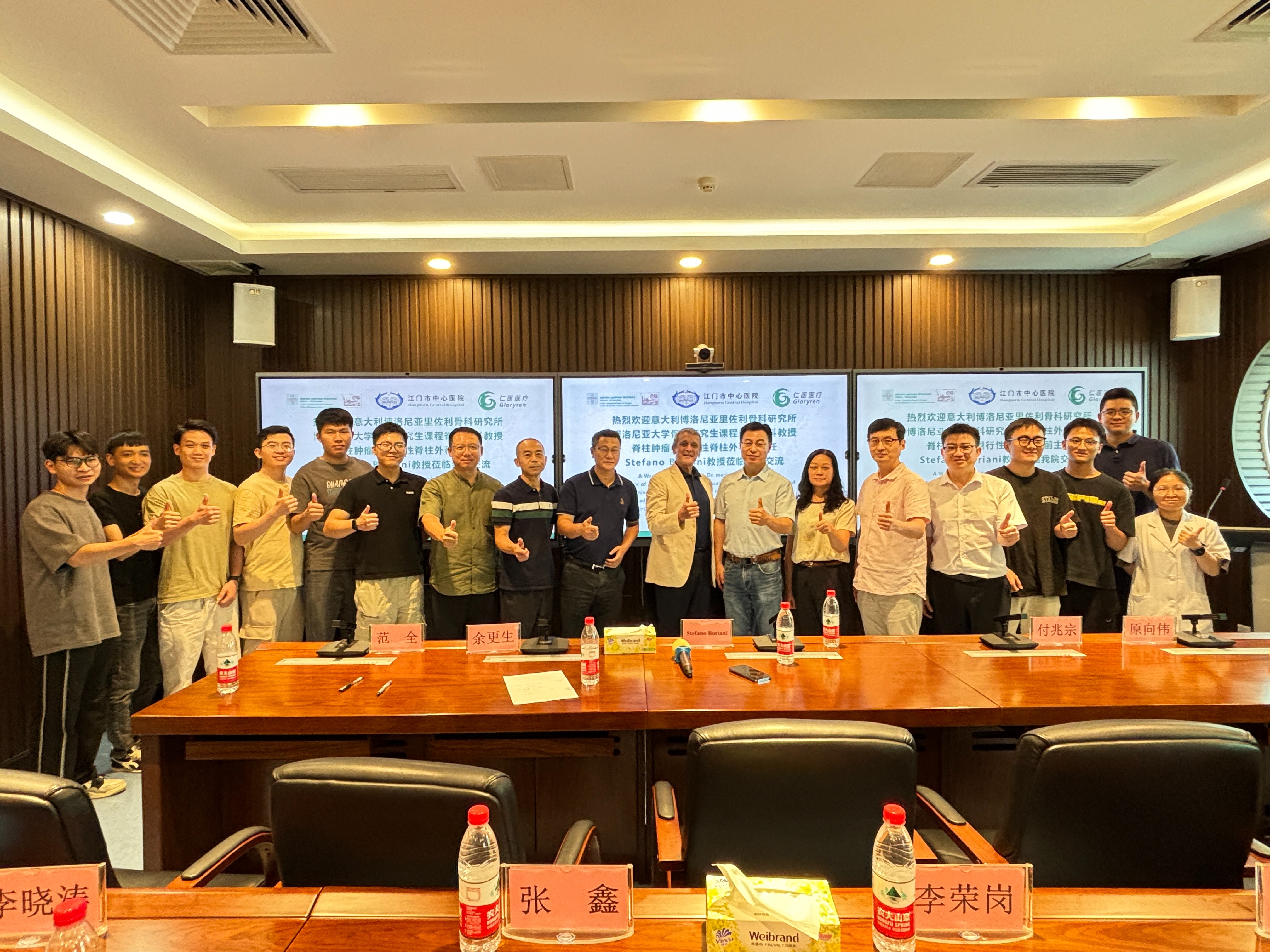-
News & Events

From August 26th to 30th in 2024, Prof. Boriani, the world-class master for spinal tumor, the co-founder of WBB surgical staging system, the Professor of Spine Surgery of the post-graduate Program of Orthopedics at the University of Bologna at IRCCS Rizzoli Orthopedic Institute and the Past Head of the Unit of Spine Oncology and Degenerative Surgery at IRCCS Rizzoli Orthopedic Institute came to Jiangmen Central Hospital as its international visiting professor and carried out a series of activities for academic exchanges, including outpatient clinics, making ward rounds, providing surgical guidance, performing operations, giving training to the department, discussing the management of the department and difficult cases, giving public classes and so on.
From August 26th to 30th, Prof. Boriani, a World-class Master of Spinal Tumor who had developed the WBB staging system, was invited to Jiangmen Central Hospital as a visiting professor for one week. Prof. Boriani is the Professor of Spine Surgery of the post-graduate Program of Orthopedics at the University of Bologna at IRCCS Rizzoli Orthopedic Institute and the Past Head of the Unit of Spine Oncology and Degenerative Surgery at IRCCS Rizzoli Orthopedic Institute. His mentor was Prof. Mario Campanacci, a pioneer in the study and classification of bone tumors, and also an excellent scientist and orthopedic surgeon. In 1984, under the guidance of Prof. Companacci, Prof. Boriani started his work on spinal tumors. He has dedicated his life to the study of spinal tumors with over 30 years of experience and over 2000 cases studied to date.
During the one-week visit to Jiangmen Central Hospital, Prof. Boriani carried out a series of academic exchanges led and accompanied by the Party Secretary HUANG Yanming, Deputy Party Secretary and President RUAN Xiaohong, Member of the Party Committee and Vice President ZHAO Jinglin, Acting Director of Spine Surgery YUAN Xiangwei, Chief Physician of Spine Surgery FU Zhaozong and the team of Spine Surgery, including outpatient clinic, ward rounds, complex case discussions, surgical guidance, and Spinal Tumor Master Open Lectures. During the academic exchange, Prof. Boriani particularly shared his experience in the diagnosis and treatment of the chordoma of the spine and the sacrum, and spinal metastases. He praised the Spine Surgery team of Jiangmen Central Hospital. The team can communicate in fluent English, which contributes to the cheerful atmosphere. All of them actively interacted with Prof. Boriani and discussed the diagnosis and treatment experience of spinal tumors and other spinal diseases. Prof. Boriani noted that although spinal tumors are rare diseases, they are not so uncommon in Jiangmen, which has a population of five million. He hoped that his sharing would bring practical help to the Spine Surgery team of Jiangmen Central Hospital and bring new inspiration for their study of spinal tumors. Prof. Boriani expected that both parties would have the opportunity to meet again in the future and jointly contribute to improving the diagnosis and treatment level of spinal tumors in the Jiangmen area.
Unveiling Ceremony of “Sino-Euro Communication Center for Spine Tumor”
On August 26th, the Party Secretary HUANG Yanming, Deputy Party Secretary and President RUAN Xiaohong, Member of the Party Committee and Vice President ZHAO Jinglin together with the heads of the Office Department, Personnel Department, Science and Teaching Department, Medical Department, Propaganda Department, and Spine Surgery Department of Jiangmen Central Hospital attended the ceremony of unveiling of the “Sino-Euro Communication Center for Spine Tumor”. The ceremony was hosted by CHEN Jinju, Director of the Office Department, and Party Secretary HUANG Yanming delivered a speech to welcome Prof. Boriani.
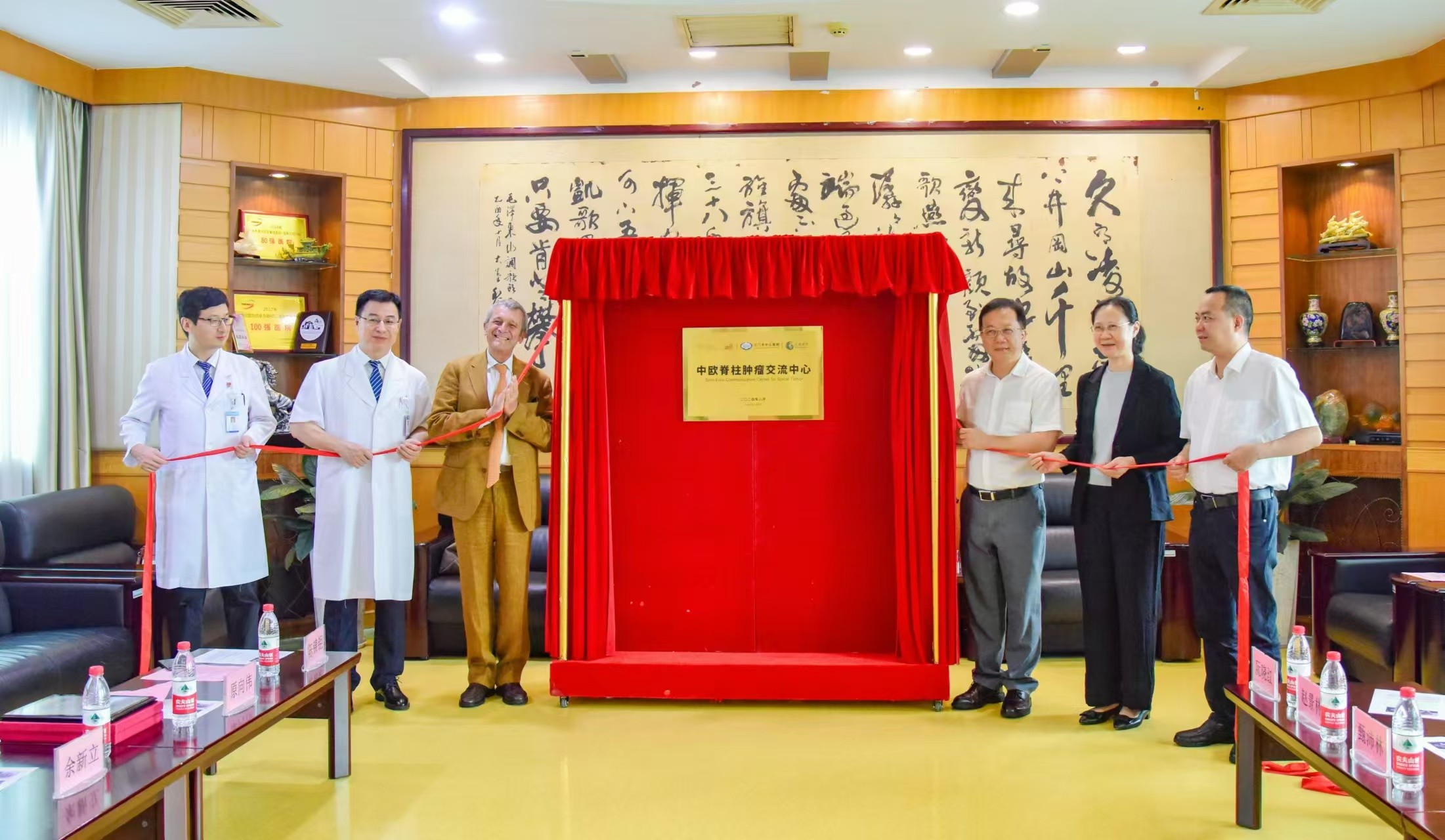
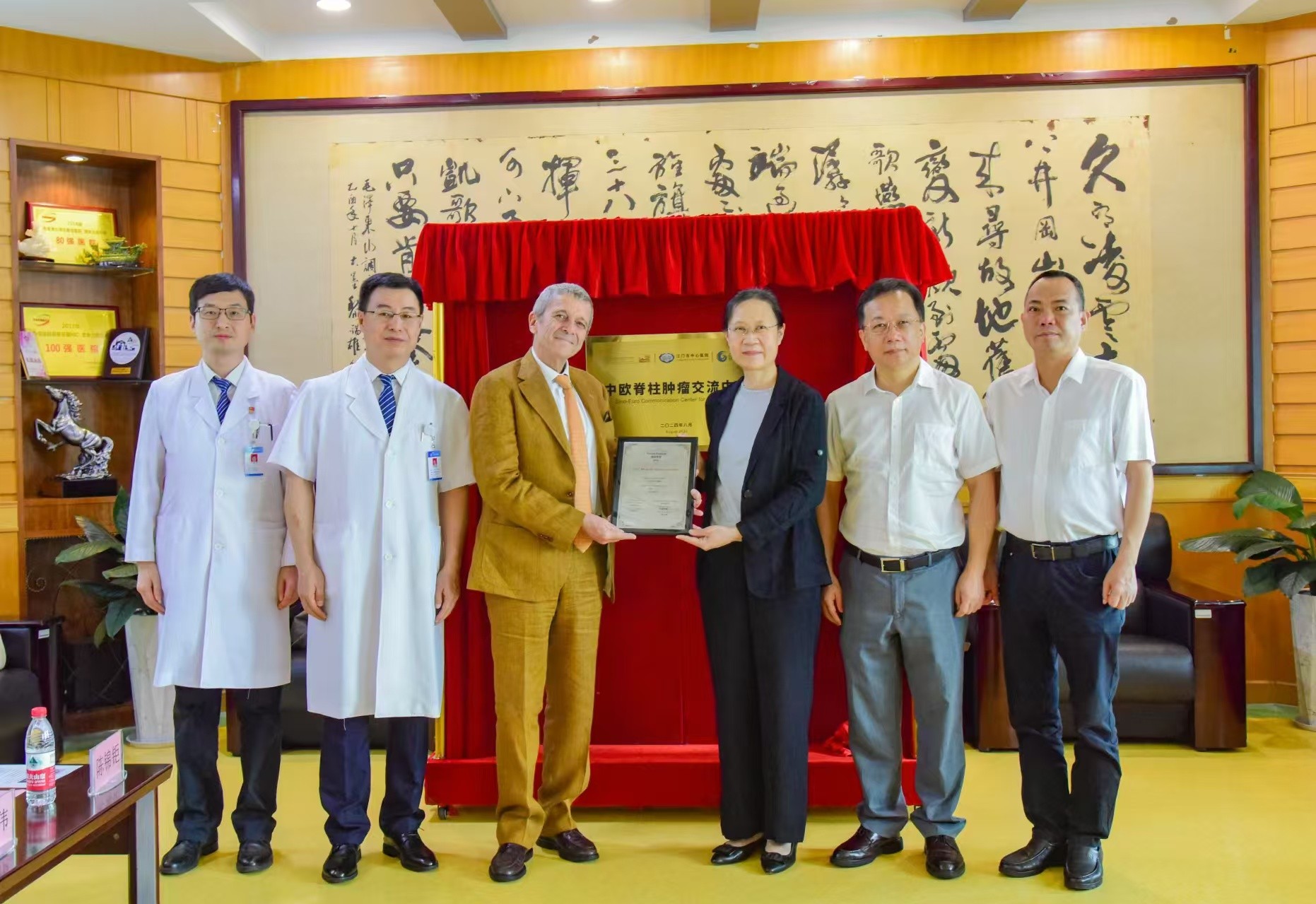
Issuing of Letter of Appointment of Visiting Professor
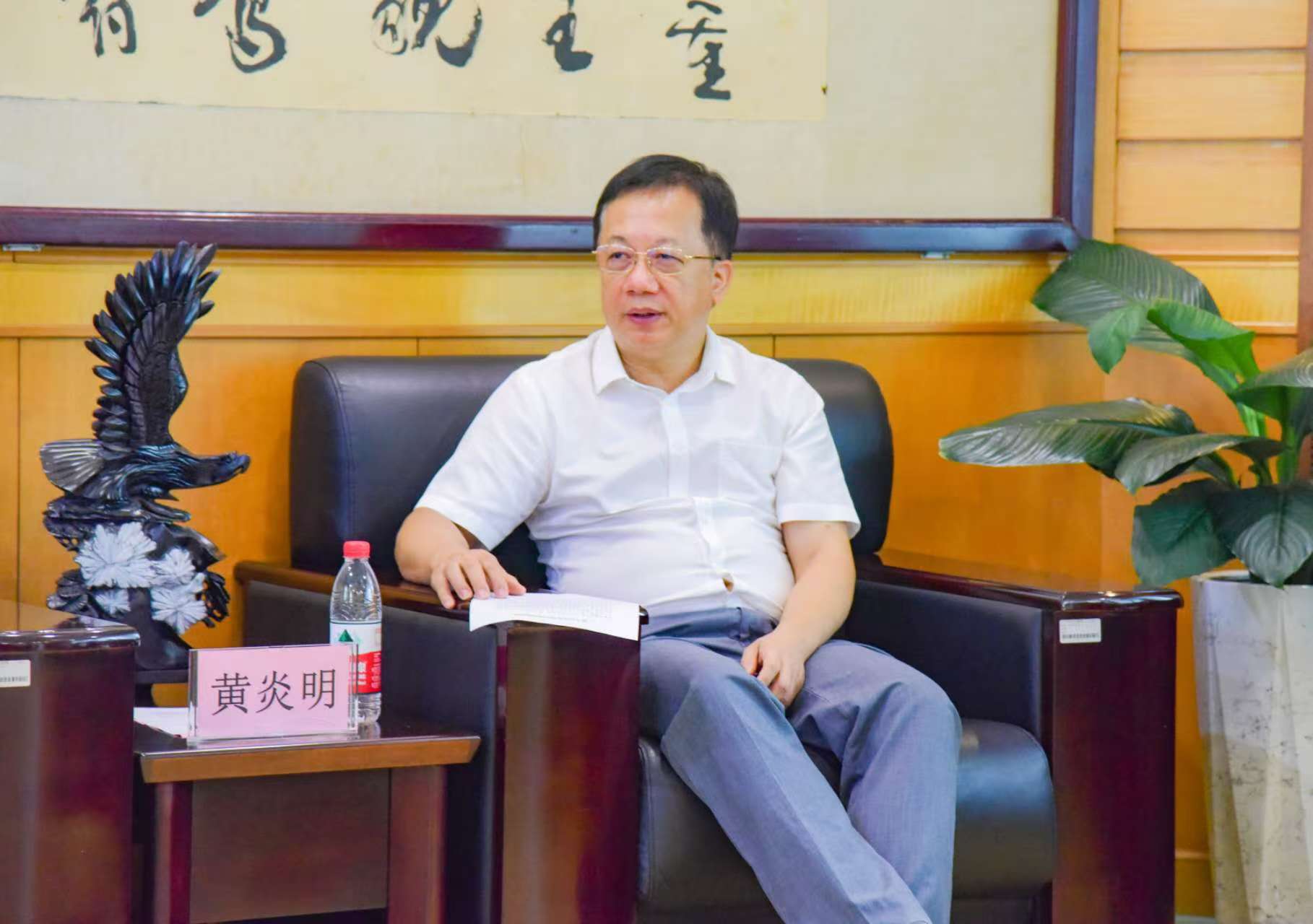
Party Secretary HUANG Yanming firstly expressed his warm welcome to Prof. Boriani who came all the way here and introduced the development history of the hospital. Jiangmen Central Hospital is the largest medical center in Wuyi area and the leading hospital in medical development of the region. In recent years, Jiangmen Central Hospital has continuously strengthened the construction of specialties and taken the lead in carrying out many high-level technologies. The diagnosis and treatment level for spine tumor is an important reflection of the performance of a spine surgery department. “Sino-Euro Communication Center for Spine Tumor” was built in Jiangmen Central Hospital, realizing the international connection in this field. On this basis, Jiangmen Central Hospital will continue to strengthen international exchanges and promote the cooperation between China and Europe in the medical field for the benefit of Jiangmen people.
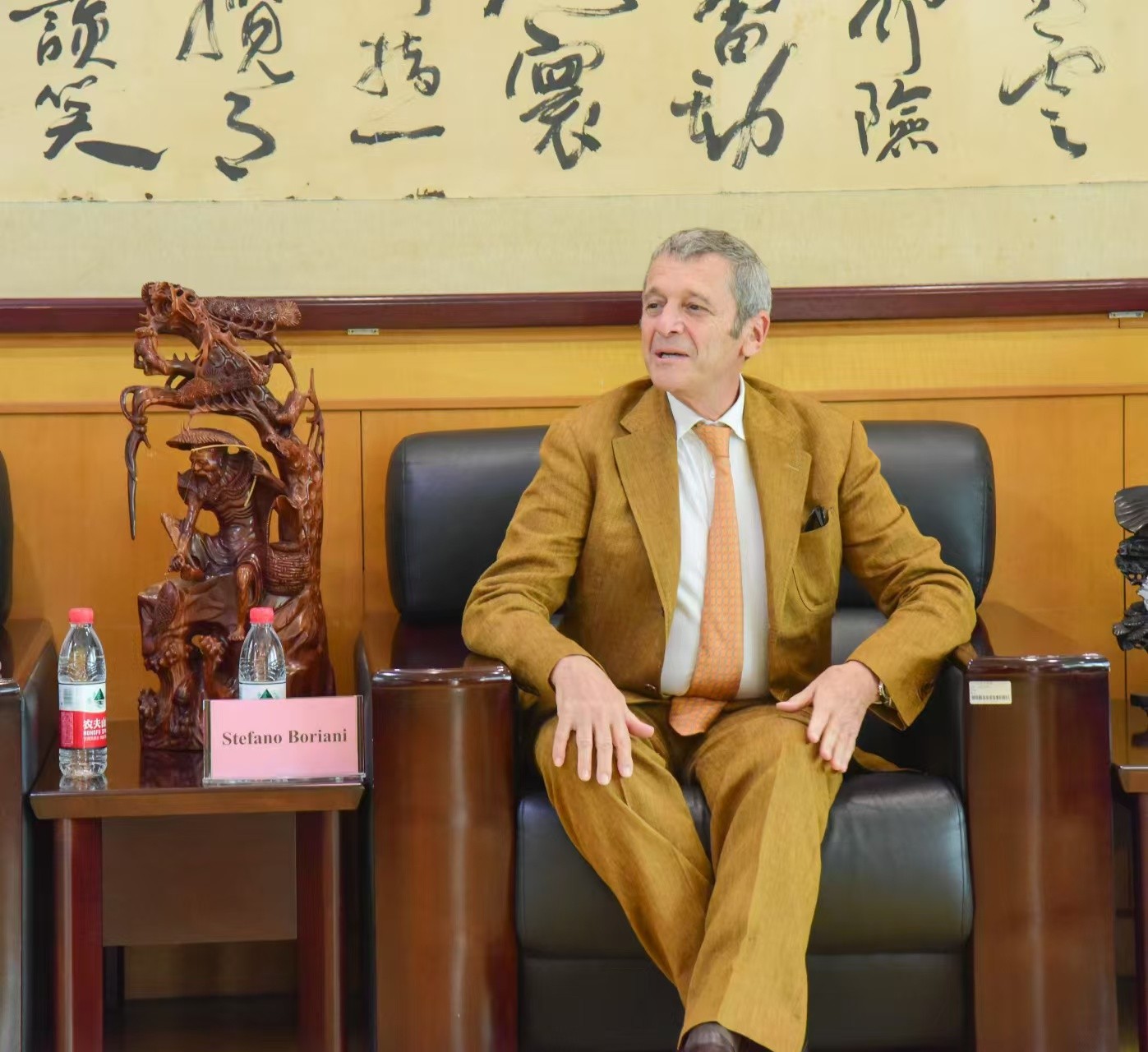
Prof. Boriani said that he was very pleased to participate in this unveiling ceremony. Jiangmen Central Hospital is a century-old hospital with a long history, just like the Rizzoli Orthopaedic Institute where he works. He hoped that this exchange would be a starting point to strengthen the academic exchanges between the two sides, and to promote the development of spinal oncology and spinal surgery in China and Europe.
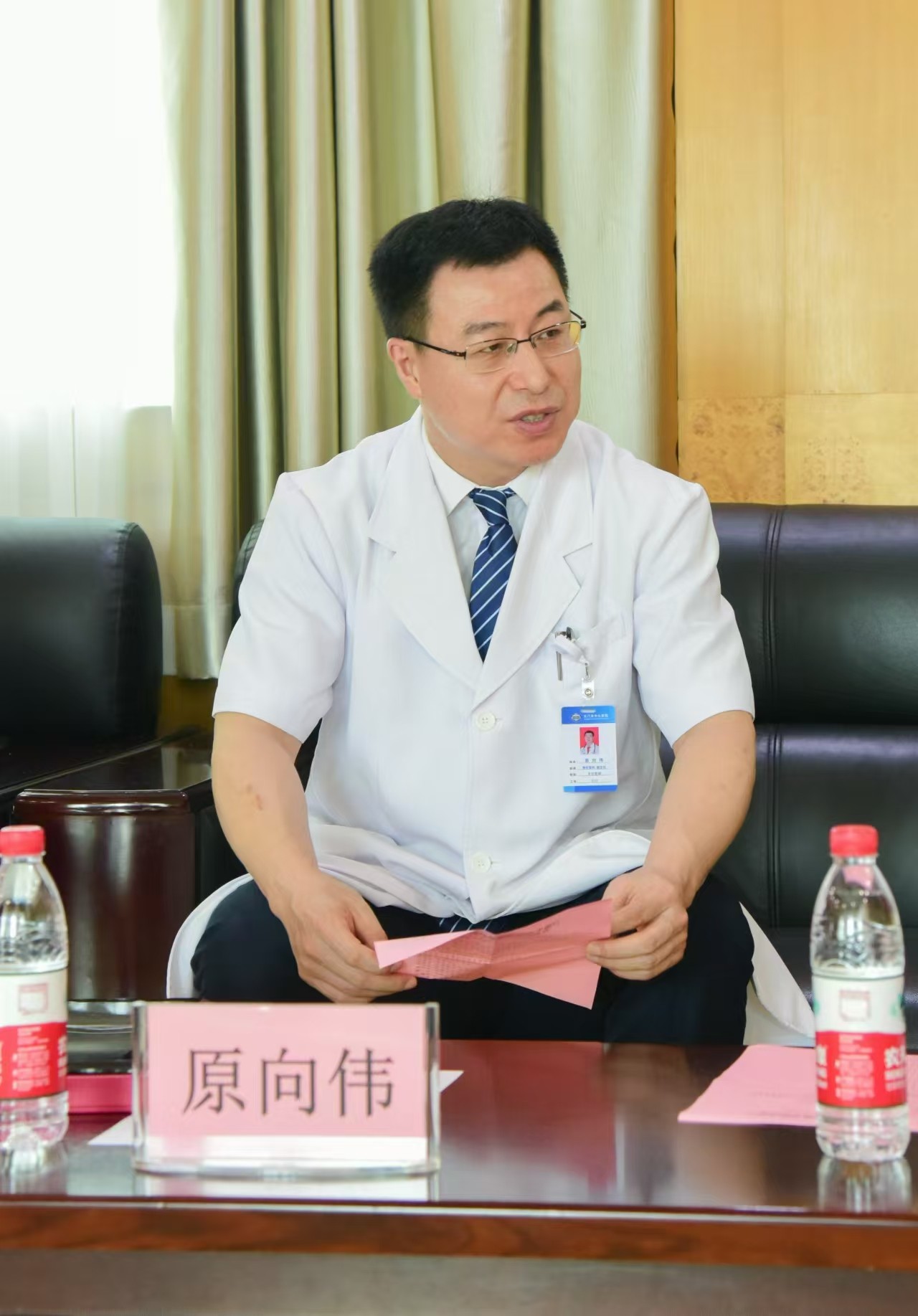
YUAN Xiangwei, Acting Director of the Spine Surgery Department, welcomed Prof. Boriani and introduced the development of the Spine Surgery Department. In recent years, the Spine Surgery Department has been developing rapidly under the strong support of the hospital leadership. Adhering to the concept of providing “fine” treatment for common diseases, “good” treatment for difficult diseases and “safe” handling for complex surgeries, the department has done a lot of work in minimally invasive spine surgery techniques and in the diagnosis and treatment of spinal tumors, spinal deformities and upper cervical spine diseases, and has made some achievements. In the future, with the platform of “Sino-Euro Communication Center for Spine Tumor”, the department will continue to strengthen the construction of the specialty, build up the foundation of academic development, and make great strides towards the goal of high-quality discipline.

Afterwards, Prof. Boriani visited the operating room of Jiangmen Central Hospital under the guide of Director Yuan’s team to learn about the surgical instruments and equipment of the hospital. After the visit, Prof. Boriani had case discussions with the spine team. Prof. Boriani once visited Jiangmen Central Hospital in 2018, so he was very looking forward to the academic exchanges this time.
Ward Rounds and Specialist Outpatient Clinic
In the morning of August 27th, under the guide of Director Yuan, Prof. Boriani conducted a ward round on the recently admitted patients, reviewing the films, checking the patients' physical examination, and getting to know the latest situation of the patients.
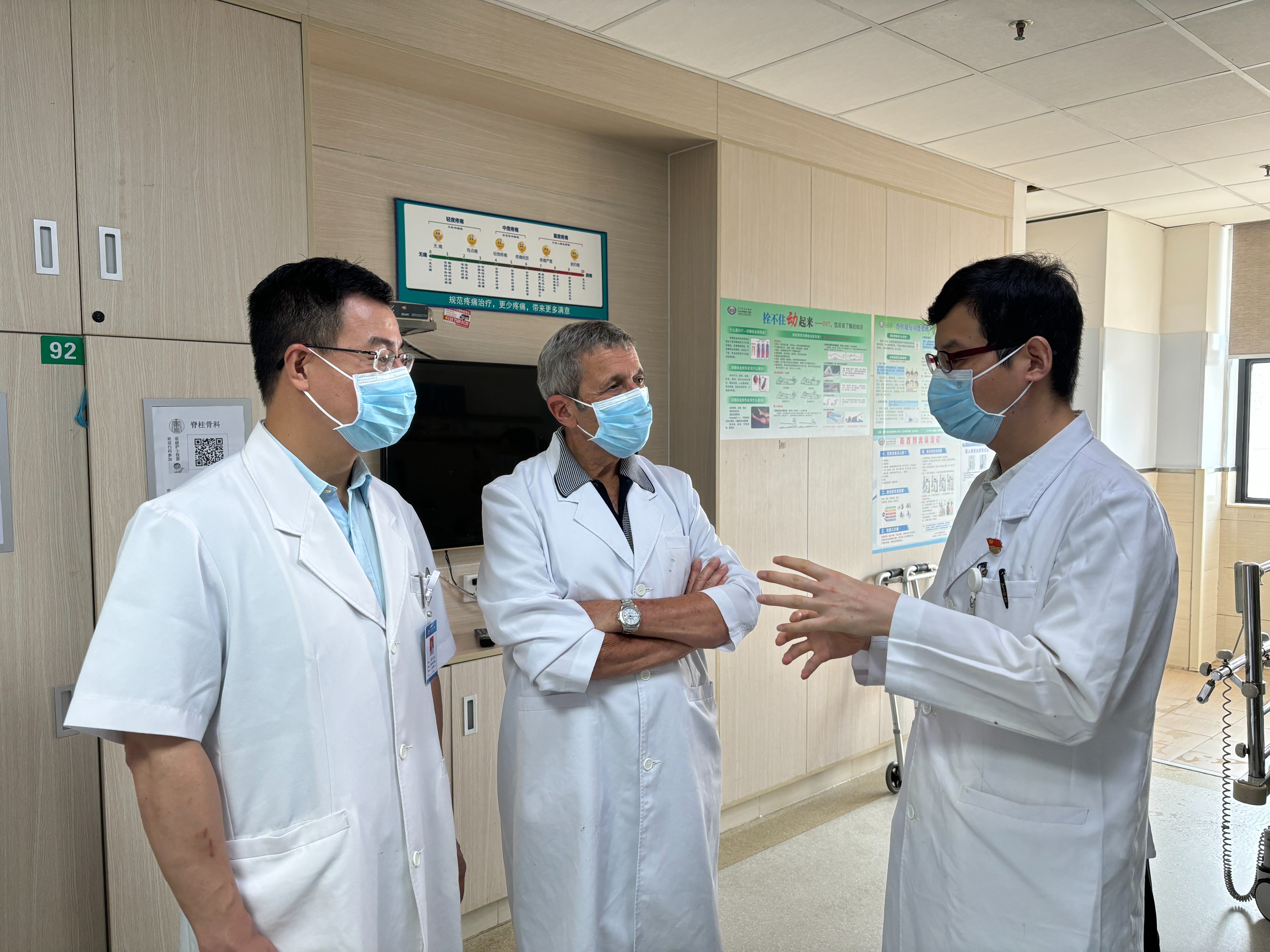
After the ward round, Prof. Boriani had an in-depth discussion with the department members about the treatment plan for the two cases of sacrum chordoma, and discussed about the proton therapy, especially pointing out that different sizes of tumors require different proton therapy equipment and radiologists with related experience.
In addition to the ward round and case discussions, Prof. Boriani and Dr. FU Zhaozong also provided consultation services to several patients in the Specialist Outpatient Clinic. One of the female patients had symptoms such as lower back pain and stiffness in the toes. Prof. Boriani checked her past images and advised that due to the severe attachment of the lipoma growing in the lumbar spine to the peripheral nerves, the patient would be difficult to operate on, and her postoperative recovery would not be promising. Therefore, the patient was not recommended to undergo surgery and physiotherapy was recommended to relieve her symptoms.
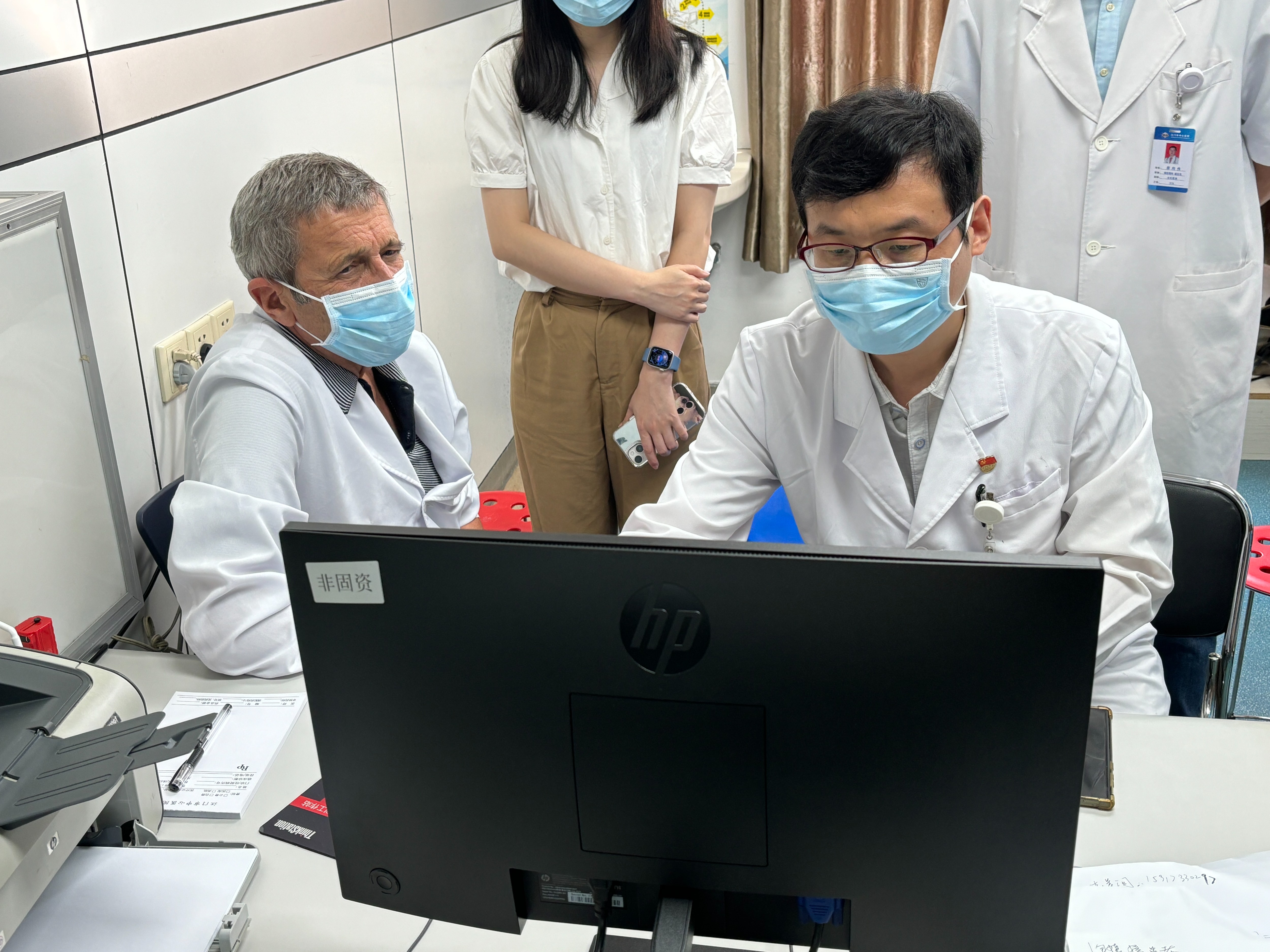
In the outpatient clinic, a male patient, who had been suffering from lumbar pain for a long time, was found to have gastric cancer in the middle of this year, which had metastasized to the lumbar spine, and the lumbar pain was completely eliminated after receiving four courses of chemotherapy recently. Prof. Boriani learned about the past medical history of the patient and checked the images of his past. According to the images, the patient's lumbar metastasis has clear margins and is in stable condition, Prof. Boriani patiently answered the patient's questions and concerns, and suggested that the patient should not worry too much about the lumbar problem, and that the patient could wait and see for a period of time before deciding on the subsequent treatment plan.
Prof. Boriani said that he had gained a lot from today's ward round and outpatient clinic, and had a very pleasant communication and discussion with the doctors of Jiangmen Central Hospital, and he hoped to share more experiences about spinal tumors with them.
Surgical Guidance
On the morning of August 28th, Prof. Boriani observed a lumbosacral decompression and fusion surgery. Prof. Boriani said that he was very happy to see the great performance of Chinese surgeons in the operation and was lucky to be able to observe the operation and communicate with Chinese colleagues during this trip.
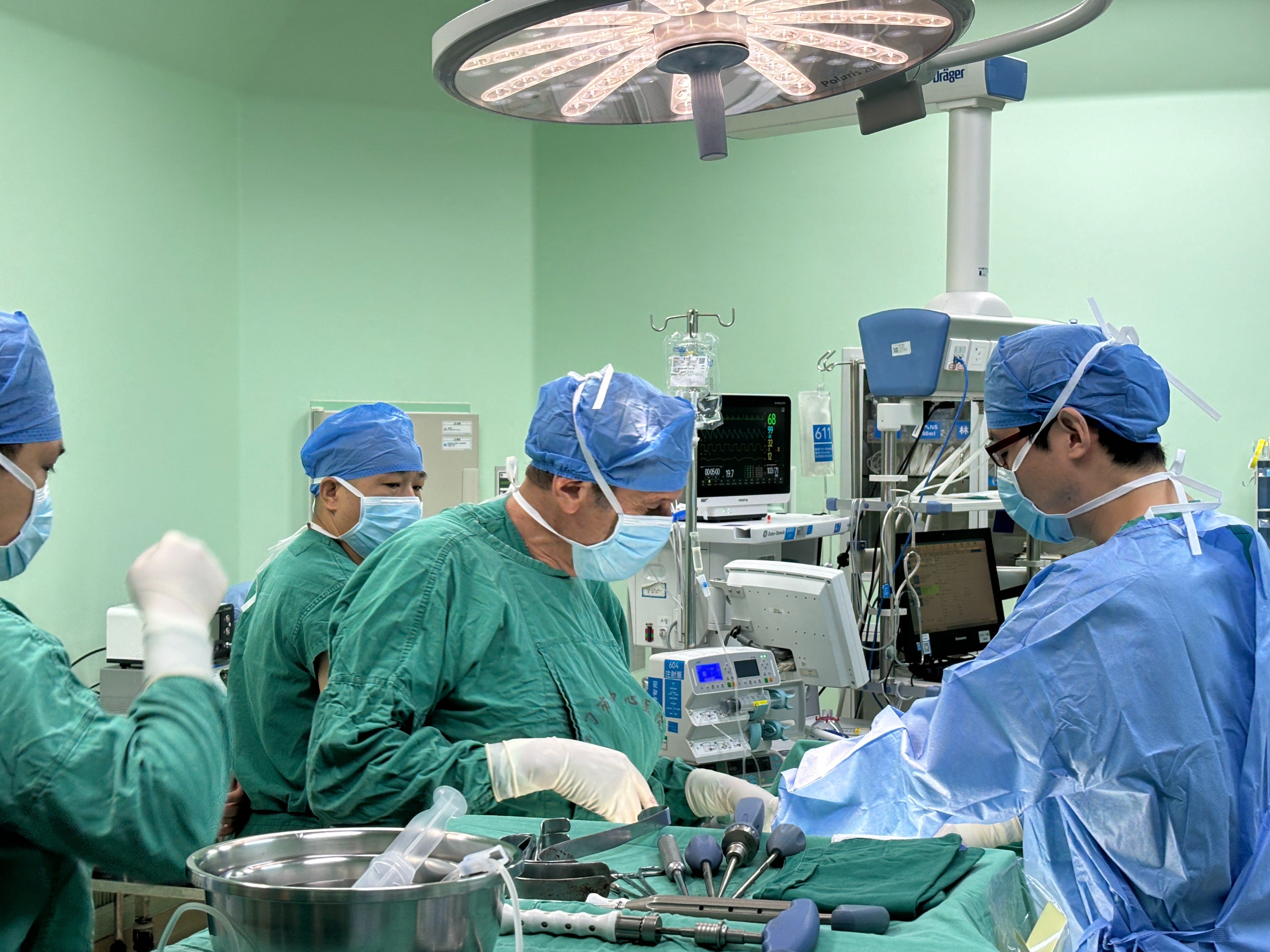
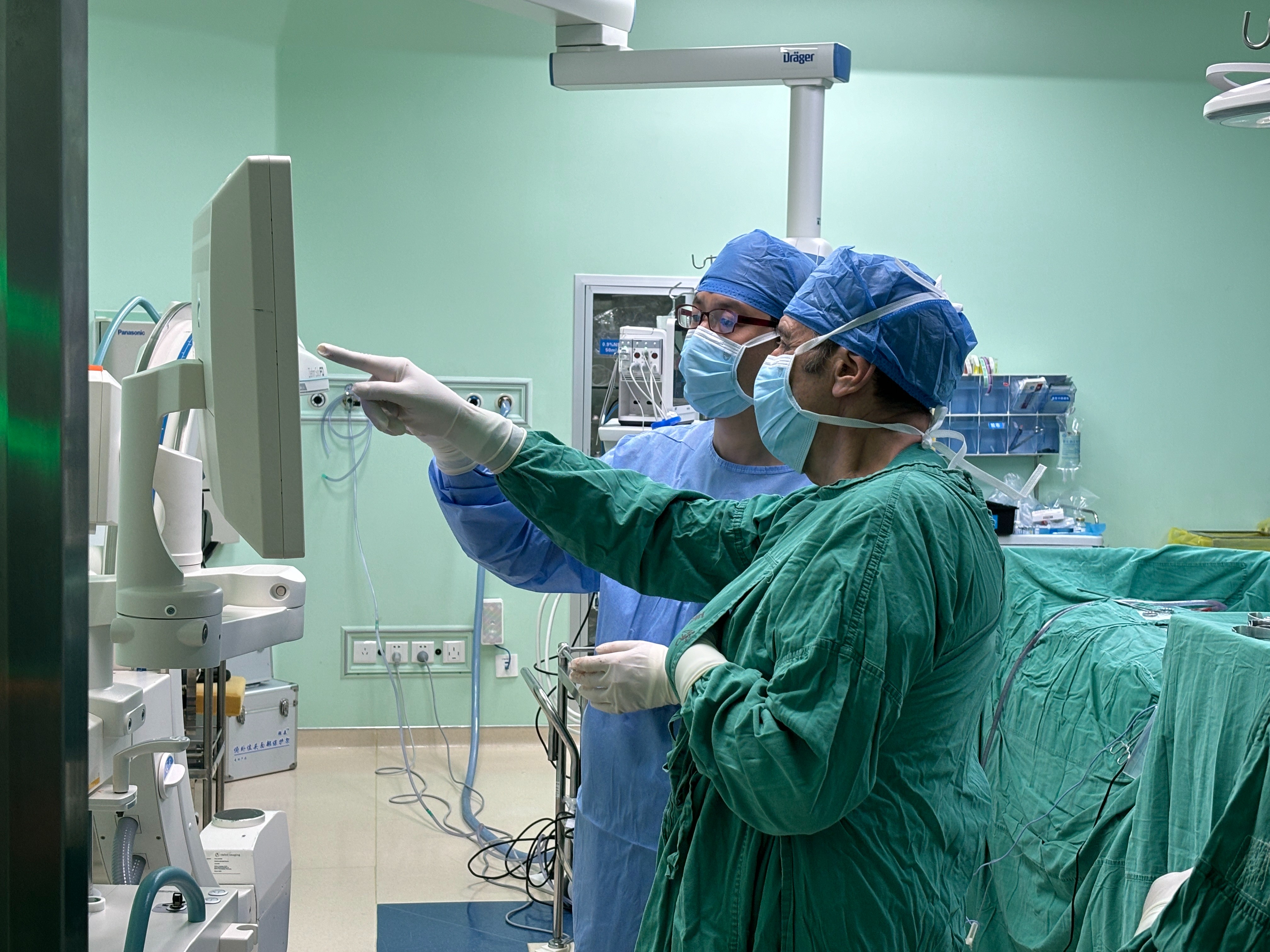
After the surgery, Prof. Boriani had case discussions with the young doctors in the department, patiently analyzing the images and giving them some treatment suggestions.

During the discussion, Prof. Boriani carefully checked the images of a patient, and thought that the patient might have a synovial cyst or arthritis at the atlantoaxial spine, which might lead to vertebral instability. He said that the vertebral instability was a secondary problem and that surgery may not be the best treatment until the diagnosis is clear. The young doctors listened attentively and planned the next treatment after hearing Prof. Boriani's suggestion.
Lecture on Chordoma of the Spine
In the afternoon of August 28th, Prof. Boriani shared a lecture on “Chordoma of the Spine”, in which he gave a detailed introduction on the definition, diagnosis, surgical and non-surgical treatment options, treatment of recurrent chordoma, and future development of diagnosis and treatment of chordoma, etc.
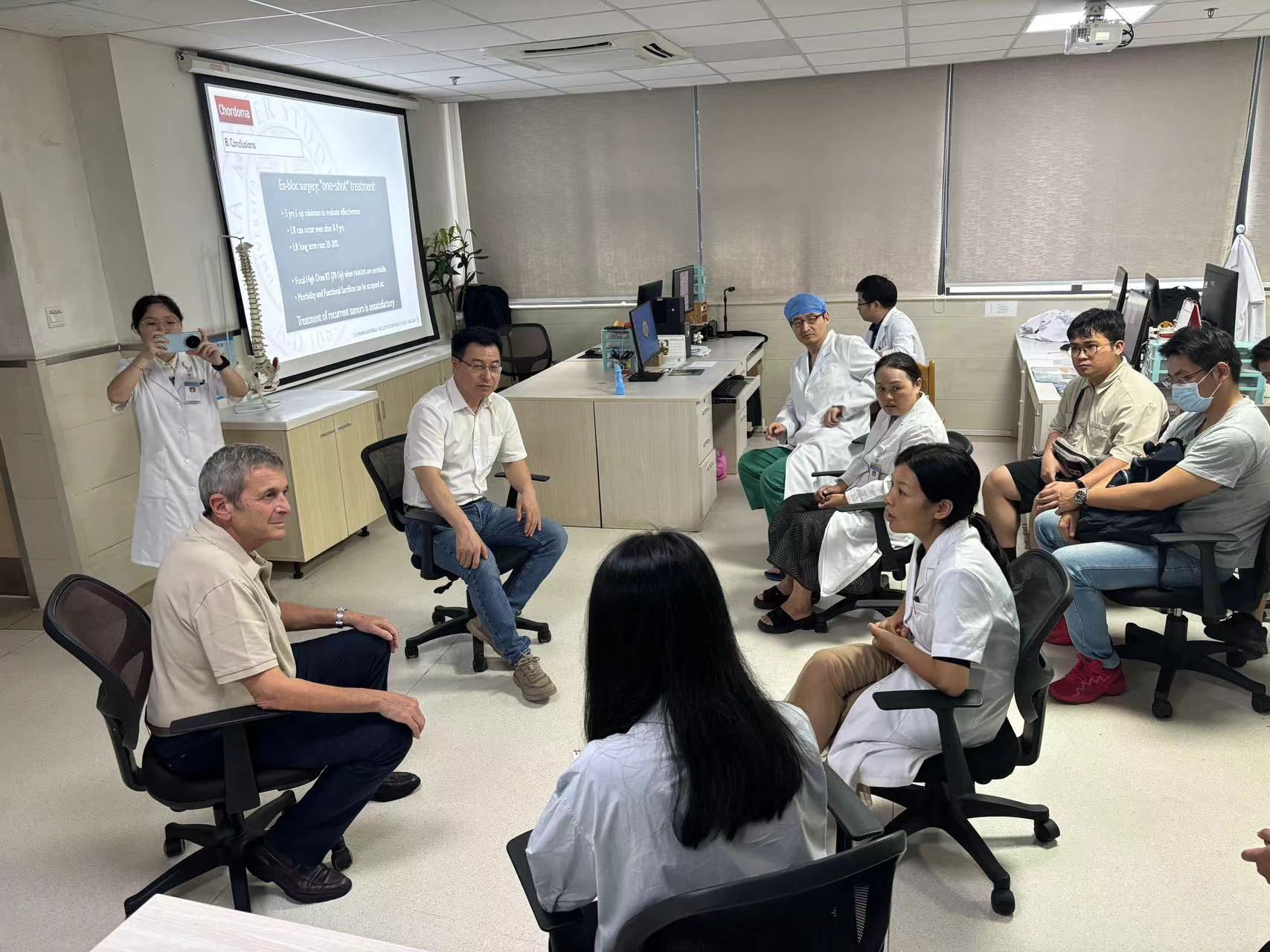
After the lecture, doctors from the Radiology Department and Pathology Department actively asked Prof. Boriani questions about the margin of chordoma, the strategy of postoperative high-dose radiotherapy and the En bloc resection, etc. Prof. Boriani has rich experience in the treatment of chordoma, and over the past 30 years, he has treated 328 cases of primary malignant spinal tumors, of which 129 cases were chordoma.
Prof. Boriani shared the epidemiology of chordoma. 18% of all primary malignant bone tumors and 40% of primary malignant bone tumors of the spine is chordoma, which is not common. After the lecture, Prof. Boriani said that he hoped his sharing could inspire the colleagues in Jiangmen Central Hospital and better help them to improve the diagnosis and treatment level of spinal tumors, which would ultimately benefit the patients.
Case Sharing of Chordoma in the Sacrum
On the morning of August 29th, Prof. Boriani had a brief discussion with Director Yuan and Dr. Fu about the selection of segments in spinal fusion. Afterwards, Prof. Boriani and Director Yuan completed a three-level lumbar decompression and fusion surgery, during which the two of them worked very well together and the surgery went very smoothly.
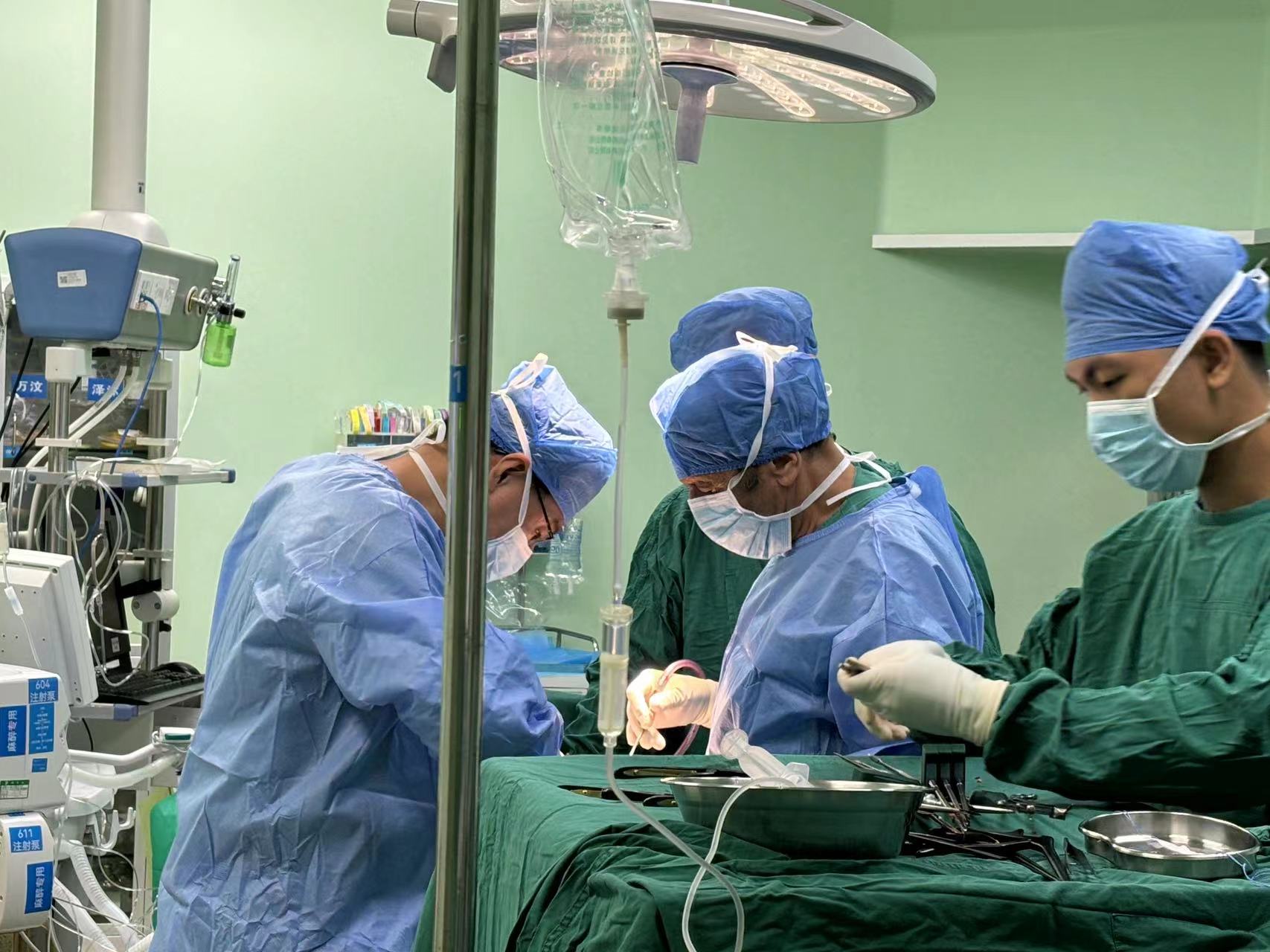
Two days before Prof. Boriani's visit to Jiangmen Central Hospital, the Spine Surgery Department coincidentally received two cases of chordoma in the sacrum, which is very rare in daily activities, but became reasonable due to Prof. Boriani's arrival.
Therefore, in the case sharing session in the afternoon, Prof. Boriani specially prepared several cases of chordoma in the sacrum and shared his experience with them. He hoped that through this sharing, he could bring practical guidance to Director Yuan and his team in treating these two patients with chordoma in the sacrum, as well as provide guidance for treating future chordoma patients.
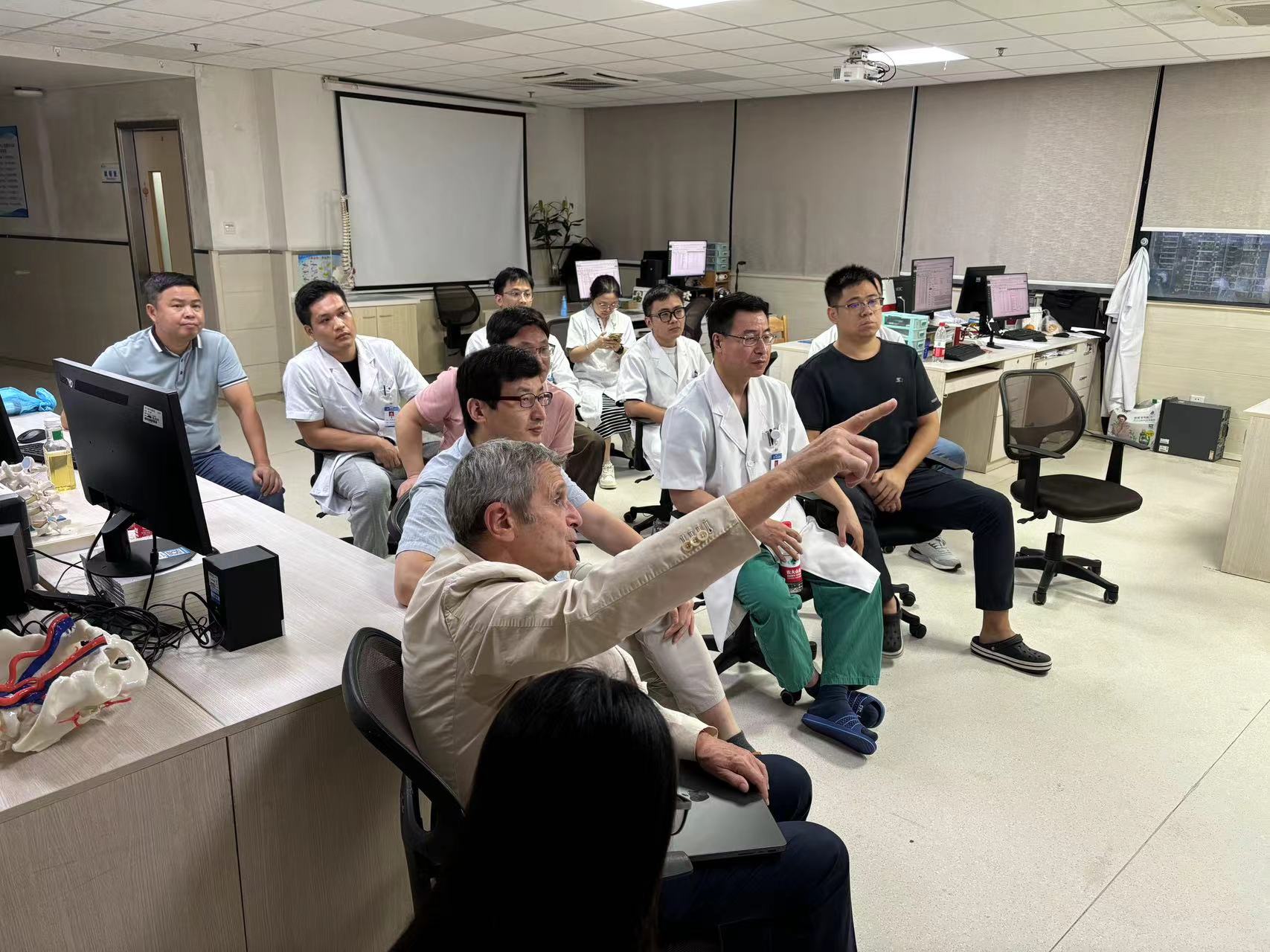
Prof. Boriani said that removing the tumor when it is small can ensure the best treatment effect, and if you wait until the tumor is large to remove it, it will not only increase the difficulty of the surgery but also cause many complications. The key to successful treatment of chordoma in the sacrum is early diagnosis and early resection.
After a round of heated discussion, Dr. FU Zhaozong shared a difficult case of myofibroblastic sarcoma, which was treated by a multidisciplinary team of thoracic surgery, vascular surgery, and neurosurgery, and the patient has a good postoperative outcome, and Prof. Boriani commended them and suggested continuous follow up of the patient.
After days of academic exchanges, Prof. Boriani found that the doctors at Jiangmen Central Hospital were very interested in the topic of selection of segments for spinal fusion. Although Prof. Boriani mainly focuses on spinal tumors, he also participates in reconstruction surgery after resection of spinal tumors and has rich experience in spinal fusion. He therefore prepared another a lecture about the topic, introducing the concepts of pelvic incidence, pelvic tilt, sacral slope and the four types of adult spinal morphology classified by the team at the Rizzoli Orthopaedic Institute.
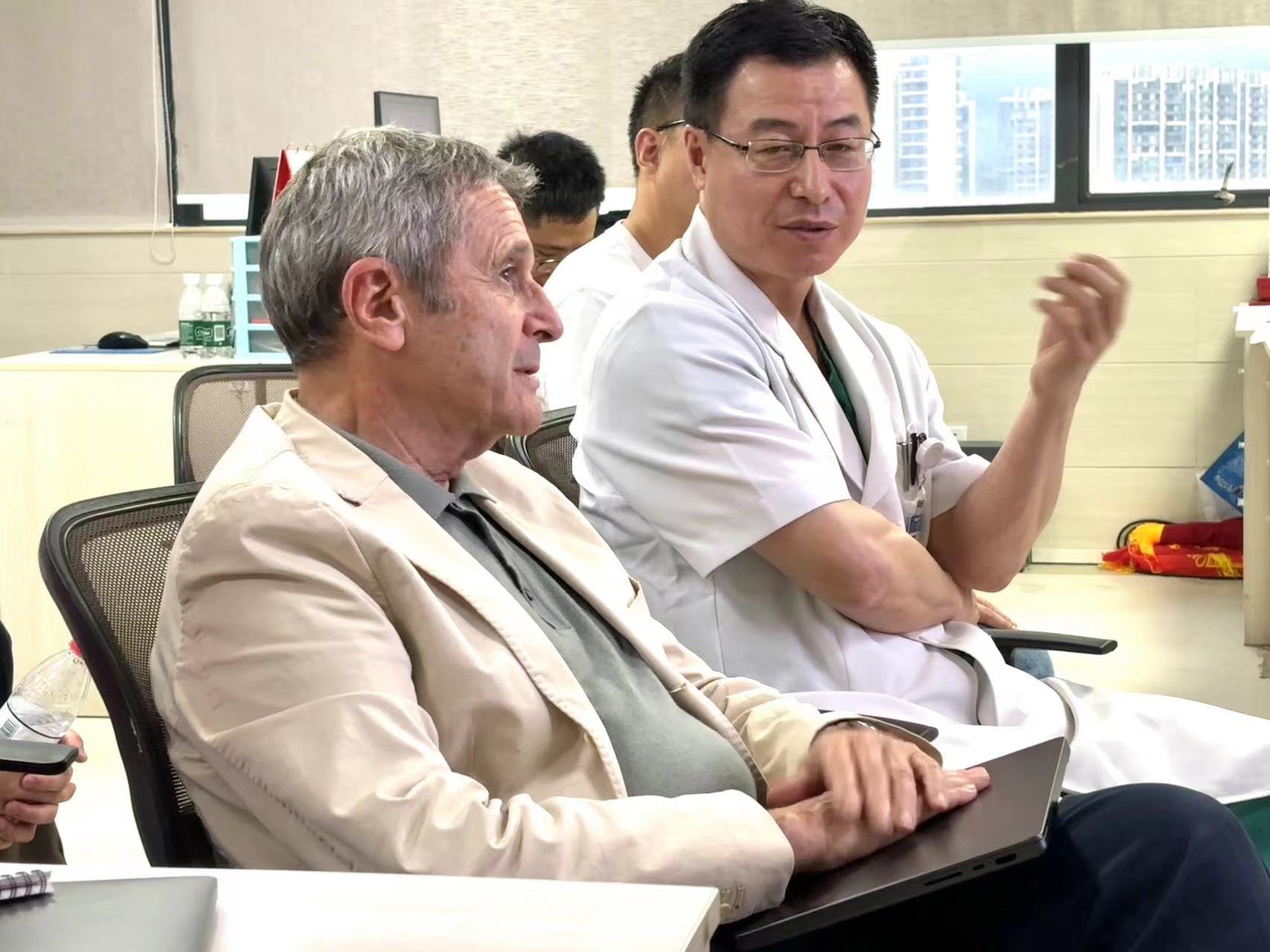
He shared that when performing a fusion surgery, the doctors need to do standing X-ray of the whole spine for the patient so that they can better decide the level of the segments to ensure that the overall balance of the spine will not be affected after the surgery. The discussion that followed was very lively and it was another fruitful day for both parties.
Master Public Lecture on Spine Tumor
August 30th was the last day of Prof. Boriani's visit to Jiangmen Central Hospital. In the morning, Prof. Boriani observed a single-segment cervical ACDF surgery through 3D microscopic monitor in the operating room. After the operation, Prof. Boriani checked the post-op images and praised the excellent performance of Chinese doctors during the operation. It was very gratifying for Prof. Boriani to see that there are so many excellent and responsible doctors in China.
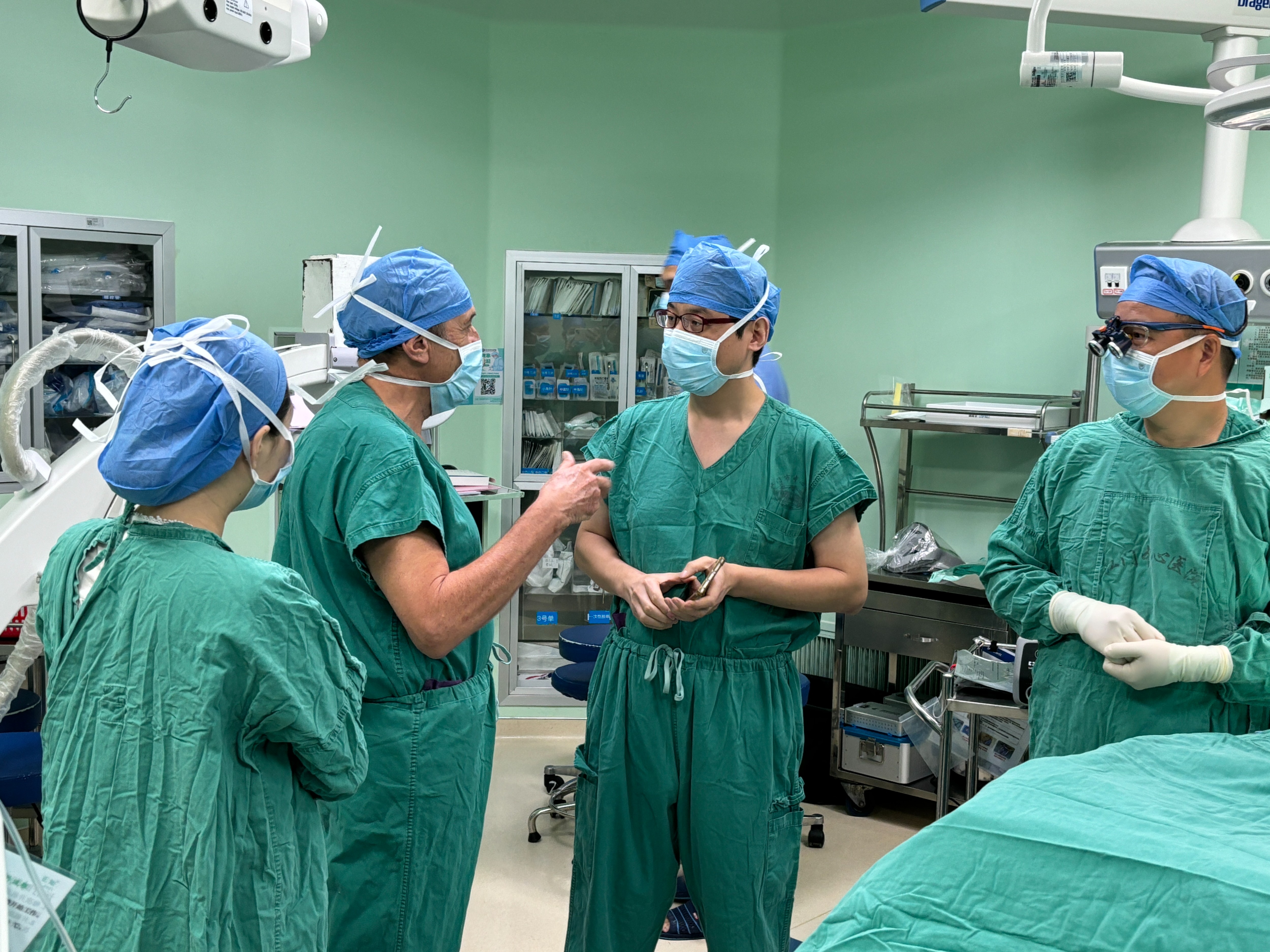
In the afternoon session of the public lecture, the guests included the doctors of the Department of Oncology, Department of Orthopedics, Department of Spine Surgery and other departments of Jiangmen Central Hospital, as well as the experts from other sister hospitals in Jiangmen City.
Prof. Boriani shared a lecture on the topic of “Bone Metastases of the Spine”, introduced in detail the flow chart of spinal metastases treatment in Rizzoli Orthopaedic Institute, and shared his rich experience in treating spinal metastases in Italy.
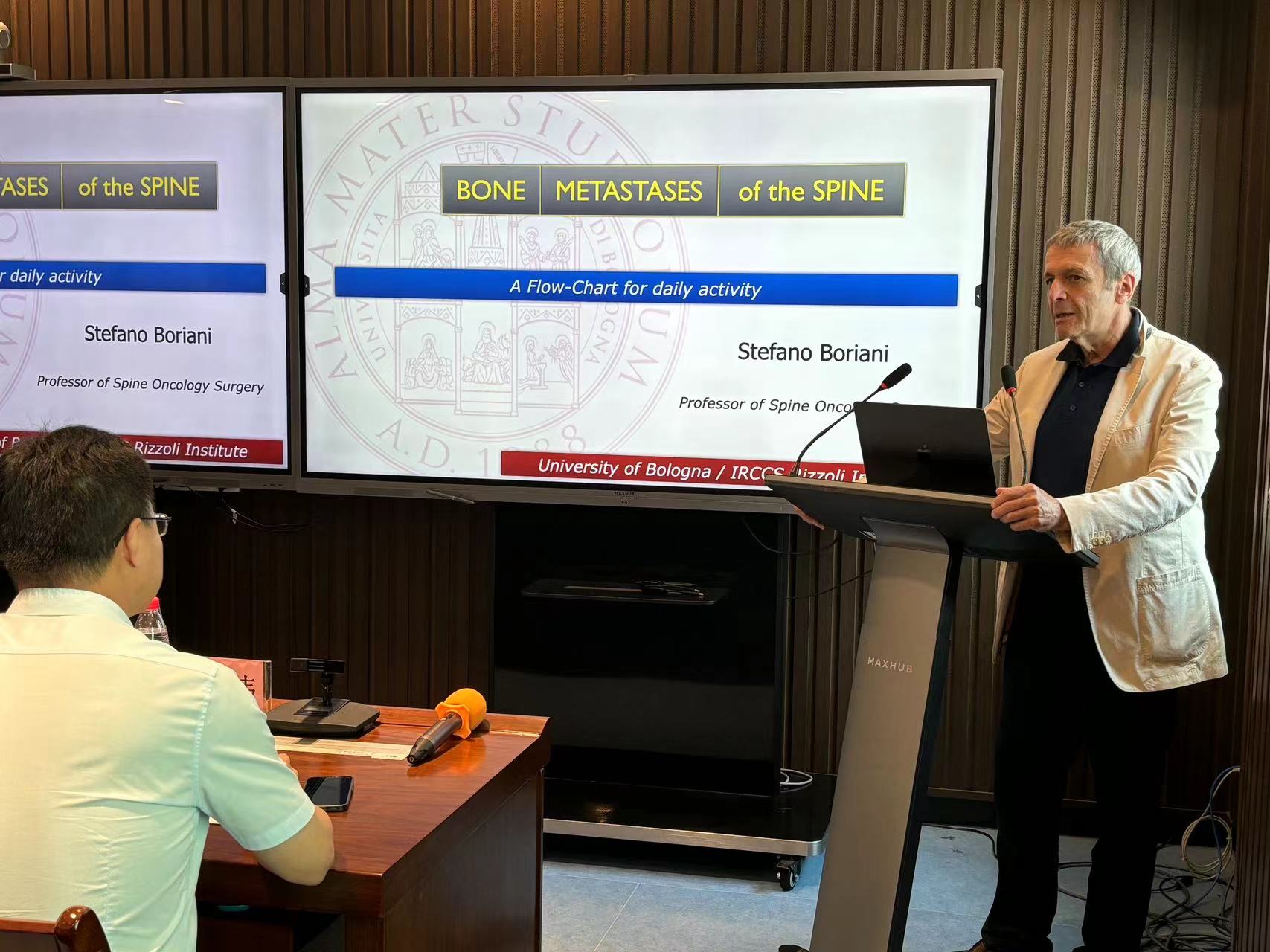
During the lecture, Prof. Boriani introduced the Bilsky score for assessing tumor compression on spinal cord and the SINS scoring system for assessing spinal instability, and explained in detail the application of the flow chart in the daily activity with the cases of metastatic tumors of the spine. He emphasized that the treatment concepts of primary spine tumors and metastatic tumors are different, and for metastatic tumors, the most important thing is not to pursue the complete resection of the tumor, but to improve the quality of life of the patients.
In the discussion session, the doctors on site asked Prof. Boriani many questions, for example, when the patient is sensitive to radiotherapy, if the spinal cord is compressed, should the decompression or radiotherapy be given first? When the spine is instable, should we just do the decompression or is it combined with implantation of bone graft or bone cement to enhance stability? How to evaluate whether patients with metastatic tumors should opt for En bloc resection? The doctors on site were very enthusiastic and actively asked questions and interacted with each other. The atmosphere of the conference was lively and both sides all learned a lot from it.
Prof. Boriani said that he was very impressed by this visit to Jiangmen Central Hospital, and he was deeply touched by the exchanges with the Chinese colleagues, and looked forward to the opportunity for both sides to meet again in the future, and to contribute to the improvement of the diagnosis and treatment level for spinal tumor in Jiangmen area.
